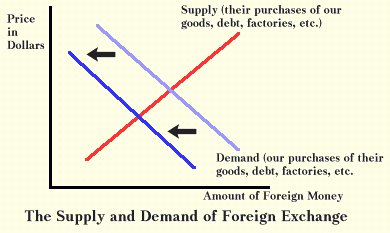- buying / selling of currency
- ex : in order to purchase souvenirs in France, 1st recession for American to sell ( supply ) their dollar and buy ( demand ) Euros
- exchange rate is determined in the foreign currency markets
- ex : currency exchange rate is approximately 77 yen to 1 U.S. dollar
- simply put, exchange rate is price of currency
- do not try to calculate exact exchange rate
- ALWAYS change the demand line on one currency graph, the supply line on the other economy's graph
- MOVE the lines on the two currency graphs in the same direction ( R or L ) and you will have the correct answer
- IF demand on the other graph increases, supply on the other will also increase
- IF demand moves to the L, supply will move to the L on the other graph
Changes in Exchange Rates
- exchange rates are a function of the supply and demand for currency
- increase in supply of currency will make it cheaper to buy one unit of the currency
- decrease in supply of currency will make it more expensive to buy one unit of that currency
- increase in the demand of currency will make it more expensive to buy one unit of that currency
- decrease in the demand of currency will make it cheaper to buy one unit of that currency
Appreciation
- appreciation of a currency occurs when the exchange rate of that currency increases
- hypothetically : 100 Yen used to buy $1, now 200 Yen to buy $1
- dollar is "stronger" because one buys more Yen than it used to
Depreciation
- depreciation of currency occurs when the exchange rate of that currency decreases
- hypothetically : 100 Yen used to buy $1, now 50 Yen buys $1
- dollar is weaker because it takes fewer Yen to buy $1
- extra -
- Supply of money : comes from U.S. citizens, banks, and industries wanting to purchase government investments and assets
- making transfer payments to foreigners
- Demand of money : comes from foreigners making transfer payments to the U.S.
Dollar Appreciation :
- each dollar gets you more of the other currency
- U.S. exports gets more expensive for foreigners
- U.S. imports gets cheaper for us
- dollar leaving U.S.
- exports decrease
- imports increase
- Net exports decrease
- GDP decreases
- demand of dollar increases
- supply of dollar decreases
Dollar Depreciation :
- each dollar gets you less of the other currency
- less of foreign currency is needed to get dollar
- exports increase
- imports decrease
- money either enters U.S. :
- Net exports increase
- GDP increase
- Demand of dollar decreases
- Supply of dollar increases
On the Graph, it is inverse between demand and supply, but they move in the same direction between increase or decrease.

No comments:
Post a Comment